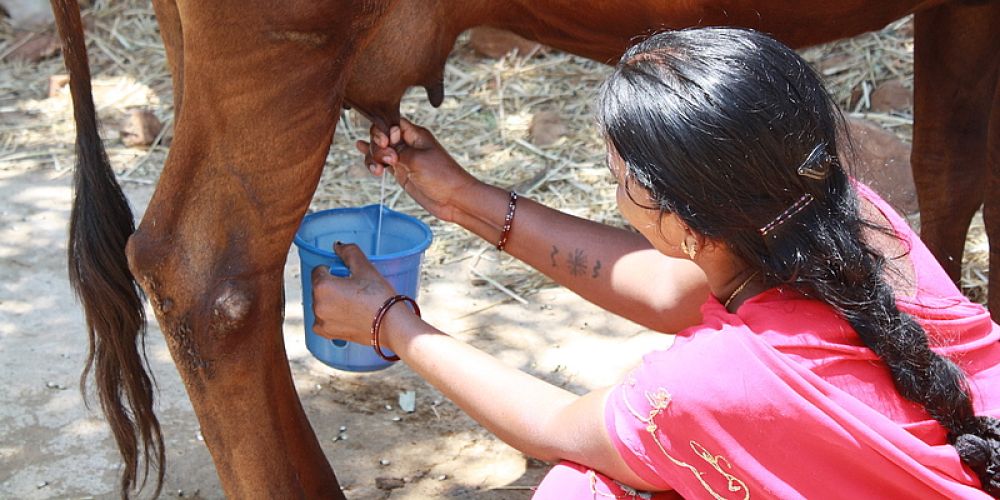
Women in the Indian village of Denkanikottai typically awaken before dawn and don brightly colored saris as they set out in a desperate search for small jobs that earn less than $2 per day.
But now 117 women are earning 200 percent to 300 percent more than the average female villager through a micro-lending program developed in 2013 by students thousands of miles away at La Sierra University in Riverside, California.
The Cow Bank program, which allows village women to lease-to-own dairy cows through the sale of the cow’s milk, achieved a new milestone last month when the students purchased a record 55 cows during a spring break visit to the village. The additional cows — 40 purchased through donations and another 15 through the repayment of funds from Cow Bank participants —nearly doubles the herd of 62 cows that students have purchased and loaned to village women over the first three years of the project.
“With the Cow Bank, we [focused] on empowering women who are left at a severe disadvantage because they are often left without any way to provide for themselves or their families,” said James Landenberger, a business major and a member of the university’s Enactus team, which developed the Cow Bank. “This is the livelihood gap that we are addressing.”
Enactus is an international nonprofit organization that encourages students to use their entrepreneurial skills to improve communities. La Sierra University’s Enactus team, now in its 25th year, has received six national trophies and two world cups for its efforts.
Read also: La Sierra University Praises No. 2 Enactus Prize as Answer to Prayer
The Cow Bank program, which has a 100 percent repayment rate on its loans, works like this: La Sierra students raise money to purchase milk cows in India at $500 per cow. The students then loan the cows to the village women, who in turn take care of the animals, milk them, and sell the milk twice a day to local organizations where the students have established partnerships and guarantees of fair payment. The women also make payments toward purchasing the cow from a portion of the milk sales and take full ownership in 18 months.
The students pay for initial veterinarian services for the cows, and the women pay insurance to protect their investments and the cow loan. The students reinvest the loan payments toward the purchase of additional milk cows.
The program initially targeted divorced and widowed women but has broadened to include day laborers and families trapped in poverty. Participants this year included a family with three children whose parents have HIV.
The success of the Cow Bank, part of a 10-year Enactus Field Station project initiated five years ago, has led La Sierra students to explore other ways of empowering the villagers.
During the spring break trip, the students also provided villagers 150 saplings, mainly pomegranate trees, allowing them to develop a future sustainable food source.
Upon discovering a high regional demand for sewing skills, the students established a sewing school in the village last year. This year, the visiting students observed the progress made over the past months. A group of women aged 16 to 23 are in the fourth month of a six-month program to learn how to sew basic garments and acquire advanced sewing skills. The participants will each receive a sewing machine through a micro-loan system similar to the Cow Bank, and will provide sewing services in local factories and villages.
Andrew Parker, a business major and co-director of the Enactus India Field Station, which oversees all the university’s programs in the village, said the self-confidence of the women acquiring sewing skills has increased drastically.
“One common response was that they were nothing, but now with the training they can make an income and also bring pride to their village and themselves,” he said.
Parker said his work with the villagers has changed his worldview as well as his notion of Seventh-day Adventist outreach.
“This project has changed my perspective on what ministry is,” he said. “This project has brought me closer to what it is to be a Christian. [It] has made me work harder and be more thankful for every blessing that I have.”